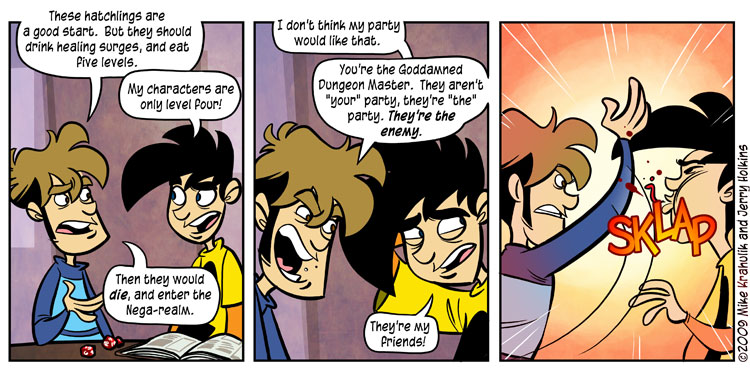Today Penny Arcade posted another comic with a roleplaying theme called “The Old Ways“.
I have been running roleplaying games as a GM for many years now and especially in my early years I was known to be much to nice to my players. They never feared anything because they were sure that I would always pull something out of my hat to save them in the end. I was wrong and many games were without any challenge which could easily lead to player boredom.
I was probably the anti-thesis of the “Evil GM” who always throws rocks in the players’ path and tries to crush them at every opportunity. A game run by such kind of game master is probably much more challenging but it is not necessarily more fun. When the players constantly fail despite their best efforts they are probably losing interest in the game.
In my opinion balance is the key: challenge the player, show them their weaknesses, let them lose once in a while but also support the party when necessary, help them drive the story and let them be the heroes. The game should be fun for all players after all!


I would go for "challenge the characters" instead of the players. That, of course, might depend on your goals for roleplaying (i.e. as it being a game of wits, or an acting and narrative challenge -for example-) rather than being a hard coded rule.
I've always gone with the "GM=player" thing so I'm very clear to people when that line is crossed (that is in the case of the example given in the comic.)
Fred
<abbr><abbr>the_blunderbusss last blog post..Re: Black Friday</abbr></abbr>
I agree with challenging the characters instead of challenging the players. That's more or less what I meant. I sometimes write character when I meant player and vice versa but since I often focus on roleplaying an less on stats, my challenges to the player character's are challenging the players, too. And I hope in a good way.
The group I GM for is filled with players who have as much gaming experience as I have GM experience. We're learning together.
The group I game with a Sunday afternoons has one player who happens to be the GM's son. He (the player) is constantly challenging his dad on the rules. Dad as a GM is constantly throwing stuff at the PC whenever son challenges a ruling.
<abbr><abbr>Vulcan Stevs last blog post..Vulcan Stev Family Movie Review: X-Files Fight the Future</abbr></abbr>
For me I think it's a matter of pacing. Would the players retain their (wounded) dignity if they came out from a failure or fleeing from a deadly combat or dying at that point would look and feel really stupid and lame to the group.
For example, it's alright to put PCs in a final showdown with the BBEG and expect either one of them to die but dying because the PCs failed a jump check over a 10 feet wide chasm would seem lame.
But a word of caution though, some players can take their PC's death quite personal and seriously and it gets taken out of the table.
<abbr><abbr>Questing GMs last blog post..Word of Wizards – 7/3/09</abbr></abbr>